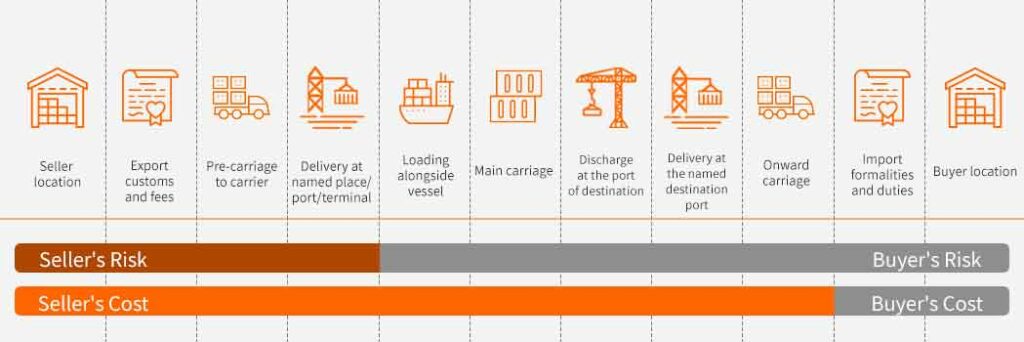In shipping terms, CIP stands for “Carriage and Insurance Paid To.” It aims to delineate the responsibilities of buyers and sellers concerning the transportation and insurance of goods. Read on further to gain its meaning and practical applications in this blog.
CIP meaning in shipping terms
CIP shipping means that the seller bears the cost of freight and insurance and hands the goods to the initial carrier, such as a freight forwarder or airline, responsible for moving the goods.
Usually, CIP shipping terms cover various modes, including road, rail, sea, inland waterway, air, or multimodal transport.
If you’re contemplating shipping under CIP terms, you should thoroughly review the specifics of the contract. This shipping term will greatly benefit you when using a Letter of Credit.
Example of using Carriage and Insurance Paid to
For instance, suppose you’re in the USA and wish to ship a container of electronic products from China. You or your supplier would need to engage a freight forwarder, such as Airsupply, to handle the transportation of your cargo.
With CIP terms, your supplier in China, acting as the shipper, covers all freight expenses and ensures minimum insurance coverage. Then, they will manage the necessary paperwork and dispatch the electronics to Airsupply at a mutually agreed destination.
Upon the shipment’s delivery to Airsupply, your supplier’s task is complete, and you will be liable for full risks and any additional charges.
Responsibility and risk transfer
What should the seller do:
- Prepare goods and shipping documentation.
- Ensure packaging, labeling, and marking adhere to requirements.
- Cover expenses associated with essential pre-shipment inspections.
- Obtain necessary licenses and authorizations for exportation.
- Arrange for pre-carriage and delivery to the designated carrier.
- Bear the cost of transporting goods to the specified destination.
- Provide all-risk insurance coverage for the duration of transit.
What should the buyer do:
- Complete the payment for goods as outlined in the sales contract.
- Handle import licenses and fulfill associated formalities.
- Settle import duties, taxes, and clearance charges.
- Coordinate the pickup of goods at the agreed-upon destination.
Risk transfer:
Although the seller is answerable for insurance, the risk transfers to the buyer upon the cargo handover to the first carrier. At this moment, the carrier takes charge of the goods. It means that regardless of the shipping mode chosen, the buyer remains responsible during the main carriage.

Insurance and coverage for CIP shipping
Typically, the seller is required to insure goods in transit for 110% of the contract value.
Unless stated otherwise in the sales contract, sellers are not obliged to organize insurance for pre-carriage in the export country or transport in the import country.
The insurance obtained by the seller must comply with the terms and conditions outlined in the CIP agreement. It should offer comprehensive coverage for the goods, beginning from the point of shipment and continuing until they arrive at the specified place of receipt.
If the buyer deems the existing coverage inadequate, they can negotiate an agreed level of coverage elsewhere within the sales contract or arrange it independently.
Difference between CIF and CIP
The two Incoterms are very similar, as both involve the seller being responsible for the cost of insurance and logistics to deliver the goods to the buyer.
However, there are still some key differences.
First, CIP shipping suits all transport methods, whereas CIF only applies to sea freight or inland waterway transport.
Second, for CIF shipping, the seller arranges and pays for shipping and insurance to the destination port, and the risk transfers to the buyer upon delivery and unloading at the port.
In contrast, with CIP terms, the seller takes responsibility for the cargo freight to the carrier’s loading location, which can be any place, not necessarily a port.
Conclusion
In a word, CIP shipping streamlines the logistics process for buyers by placing the onus of transportation and insurance on the seller.
As a member of Airsupply, you can enjoy guidance and advice on the implementation and execution of CIP contracts for both buyers and sellers.
We can manage and select the appropriate mode of transport (air, sea, land), organize shipments, and ensure timely delivery to the specified location.
Furthermore, we can assist in procuring suitable insurance policies that offer full coverage against loss or damage during transit, providing peace of mind to both parties.




